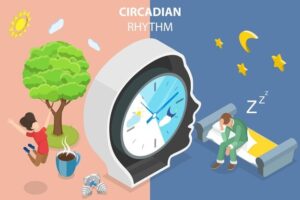Effects of Disruptions in Circadian Rhythm and How It Triggers Migraine
Migraines are a common, debilitating neurological disorder that affects millions of individuals worldwide. For people who suffer from recurrent migraines, the search for triggers can seem never-ending—foods, weather changes, stress levels, and sleep disruptions are all documented offenders. However, a lesser-known but important element in migraine frequency and intensity is disruption of our circadian rhythm, which is the natural internal clock that regulates our sleep-wake cycle. This blog by Jaslok Hospital, Best headache & migraine clinic in mumbai, on how this internal clock works and how it affects migraines will provide useful information for people looking for relief from these painful episodes.
What is the Circadian Rhythm, and How Does It Work?

The circadian rhythm is an internal 24-hour cycle that regulates a variety of physiological activities such as sleep-wake rhythms, hormone synthesis, and metabolic activity. This rhythm is primarily regulated by the hypothalamus, a brain region that functions as a master clock. Light exposure is important in this process, since it signals the brain to release hormones such as melatonin, which prepares the body for sleep, and cortisol, which promotes wakefulness.
While everyone’s circadian rhythm varies slightly, maintaining a consistent rhythm is critical for overall health and well-being. Irregularities in this cycle can cause sleep disruptions, hormonal abnormalities, and even cognitive issues, all of which contribute to migraines.
Understanding Migraine Triggers and Their Relation to Sleep Patterns

Migraines are complex, with multiple causes. While each person’s causes are unique, some of the most prevalent include stress, environmental changes, specific meals, hormone shifts, and, most importantly, inadequate sleep. Sleep is an important part of migraine care because it helps control hormonal and neurological processes that, if interrupted, can result in migraine attacks.
As per the best migraine doctors in mumbai Those who suffer from migraines must have a consistent sleep routine. Irregular sleep patterns or poor-quality sleep, particularly a lack of deep sleep, can increase migraine frequency. When the brain does not receive enough rest, it becomes more sensitive to stimuli that would not normally cause issues, which can lead to migraines.
How Circadian Rhythm Disruptions Lead to Migraines

Circadian rhythm disruptions can cause migraines because they affect neurotransmitters, hormones, and brain function. The key ways stated by the best hospital for rtms for migraine in mumbai in which these disturbances affect migraines include:
- Neurotransmitter disruptions: Irregular sleep-wake cycles disrupt the release of neurotransmitters including serotonin and dopamine, which regulate mood, sleep, and pain perception. Low serotonin levels, in particular, have been associated to migraines, as serotonin controls both pain and vascular function in the brain.
- Hormonal Changes: Circadian abnormalities affect hormones such as melatonin and cortisol, which influence sleep and stress. Low melatonin levels, which are commonly caused by inconsistent sleep habits or late-night light exposure, have been associated to an increase in migraine frequency.
- “Migraine Brain” Hypersensitivity: Migraine sufferers frequently have hypersensitive nerve systems. Because of this hypersensitivity, their brains are more susceptible to changes in routine, such as interruptions in sleep patterns or exposure to light at unexpected hours. When circadian rhythms are interrupted, the brain becomes more sensitive to triggers, which raises the probability of migraines.
Common Circadian Rhythm Disruptions and Their Effects on Migraine Frequency

Certain lifestyle behaviors are particularly disruptive to circadian rhythms, making them frequent migraine triggers:
- Shift Work and Irregular Sleep Schedules: People who work night shifts or rotating schedules frequently experience circadian disruptions because they must sleep during the day, when the body is naturally awake. This misalignment frequently leads to poor sleep quality, which can result in migraines.
- Jet Lag and Time Zone Changes: When traveling across numerous time zones, the body’s internal clock goes out of sync with the surrounding environment, resulting in jet lag. This transient circadian disruption can cause sleep difficulties and migraines in people who are already sensitive to changes in their routines.
- Lifestyle Factors (Staying up late, high stress, irregular eating habits): Staying up late, inconsistent eating timings, and high stress levels can disrupt the circadian cycle. These alterations are especially problematic for those who have migraines since the accompanying hormonal and neurotransmitter imbalances can cause more frequent migraines.
The Role of Melatonin in Migraine Regulation

Melatonin, a hormone generated by the pineal gland, is vital for sleep regulation. Its levels rise in the evening when darkness falls, alerting the body to prepare for rest. Melatonin plays a complex role in migraine control, with lower levels being associated with increased migraine frequency.
- How Melatonin Levels Influence Migraines: According to studies at the Best hospital for rtms for migraine in Mumbai, migraine sufferers frequently have lower melatonin levels than non-migraine patients. This insufficiency may explain why inadequate sleep is such a powerful migraine trigger. Melatonin supplementation has been shown in certain studies to lessen migraine frequency and intensity, albeit the outcomes vary.
- Melatonin Supplements for Migraine Prevention: Melatonin supplements have been demonstrated to lessen migraine frequency in some people, but it is always important to contact with Best migraine specialist in Mumbai before taking any new supplement. Maintaining a consistent melatonin level can assist support the circadian cycle, potentially reducing the risk of migraine triggers.
Strategies to Reduce Circadian Rhythm Disruptions and Manage Migraines
Maintaining a stable circadian cycle can assist to reduce migraine triggers. Here are some measures that can help lessen the consequences of circadian disruptions:
- Maintain a Consistent Sleep Schedule: Going to bed and waking up at the same time every day, including weekends, can help maintain the circadian rhythm. This uniformity minimizes the probability of migraines caused by inconsistent sleep patterns.
- Optimize your sleep environment: Creating a sleep-friendly environment can improve the quality of sleep. Making the bedroom dark, quiet, and cool helps encourage melatonin production and unbroken sleep.
- Limit Screen Time Before Bed: Blue light from electronic gadgets can suppress melatonin production, making it difficult to fall asleep. Avoiding devices for at east an hour before bedtime can help boost melatonin levels and lower the probability of sleep problems.
- Light therapy: particularly natural sunlight in the morning, can help to strengthen the body’s circadian clock. For people who work night shifts, employing light therapy boxes can help to simulate natural light, perhaps reducing circadian misalignment and migraine risk.
- Manage stress levels: High stress levels can disturb the circadian rhythm, increasing migraine susceptibility. Mindfulness meditation, deep breathing exercises, and physical movement are all effective ways to alleviate stress and maintain circadian rhythms.
When to Seek Help for Sleep Disturbances Affecting Migraines

If migraines are harming your quality of life or become more severe, you should seek medical attention. The best migraine specialist in Mumbai can provide specialized advice and therapies to help you manage migraines effectively. Here are some situations in which consulting a healthcare expert is recommended:
- Severe or persistent migraines: If migraines are frequent, severe, or do not respond to lifestyle adjustments, medical intervention may be required.
- Consult sleep specialists or neurologists: Best migraine doctors in Mumbai can provide treatments for treating circadian rhythm abnormalities and may recommend drugs or therapies designed specifically for migraine sufferers.
- Potential treatments: Melatonin supplements, cognitive behavioral therapy for insomnia (CBT-I), and certain drugs can all assist regulate circadian cycles and lessen the incidence of migraines.
Related: How Does OCD Impact Decision-Making?
The relationship between circadian rhythm disruptions and migraine frequency is significant. Maintaining a consistent internal clock can help reduce migraine triggers and severity, providing patients with an effective management tool. Individuals can manage migraines and enhance their quality of life by becoming aware of circadian influences on health and making easy lifestyle changes. The science of circadian rhythms and migraines provides a promising route for anyone looking to make informed health and wellness decisions.
For those struggling with migraines linked to circadian rhythm disruptions, finding relief is possible with the right guidance and care. At Jaslok Hospital, the best headache & migraine clinic in Mumbai, our expert team of neurologists and sleep specialists offers personalized treatments to help manage migraines effectively. Trust Jaslok Hospital for compassionate, cutting-edge care tailored to improve your quality of life.

